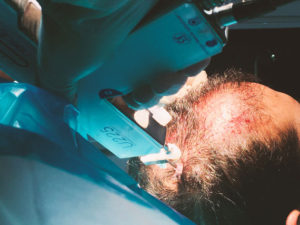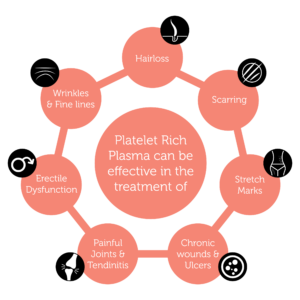As a clinician specialising in regenerative therapies for hair restoration, I have seen a broad spectrum of treatment outcomes and cost structures. This guide aims to clarify how much PRP hair treatment costs, what you should expect in return and treatment options so you can make an informed decision based on clinical evidence, not marketing hype.
What Is the Average Cost of PRP Treatment in the UK?
The average cost of PRP treatment for hair loss in the UK ranges from £200 to £600 per session. This variation reflects differences in technology, clinician experience, and whether any combination treatments are used.
- Most clinics charge between £300 and £1,000 per session.
- Premium clinics using advanced systems may charge up to £2,000 per session.
- Packages often reduce the per-session cost when multiple treatments are booked in advance.
At Rejuvence Clinic in Canary Wharf, our prp treatment prices start from £300 per session, with protocols designed around clinical need and ongoing evaluation.

Regional PRP Hair Treatment Cost Comparison
| City | Cost Range (per session) | Notes |
| London | £300–£2,200 | Premium clinics, advanced systems |
| Manchester | £250–£500 | Competitive packages but fewer tech upgrades |
| Bristol | £250–£500 | Smaller clinics, fewer tech upgrades |
| Birmingham | £250–£600 | Some new providers, entry-level systems |
What Factors Influence the Cost of PRP for Hair Loss?
Several key factors determine the final cost of your PRP hair treatment, such as:
Where the clinic is located?
Clinics based in London or other major cities typically charge higher fees due to increased operational costs and demand. However, the price is often reflective of the quality and experience offered, as well as the PRP systems used.
What technology is used?
Not all PRP systems are equal. Automated systems like Magellan TruPRP™ and Angel Arthrex™ deliver highly concentrated and pure PRP. Clinics using basic test-tube centrifugation may charge less but provide suboptimal platelet concentrations.
This difference in technology is often reflected in the price. Clinics offering lower fees typically rely on cheaper, less advanced PRP systems, which can result in reduced platelet quality and less predictable results. Choosing a clinic that invests in medical-grade, automated PRP technology ensures a higher standard of treatment and more reliable outcomes.
Who is administering the treatment?
A qualified doctor with experience in hair restoration is more likely to provide precise and effective PRP injections than a non-specialist practitioner.
What is the extent of your hair loss?
Patients with larger areas of thinning or more advanced hair loss may require more PRP, additional sessions, or add-on treatments, increasing overall cost.

Are you combining PRP with other treatments?
Add-ons such as exosomes, microneedling, and hair supplements like Replenology can significantly improve results but will add to the total cost.
How Long Do PRP Results Last and What Maintenance Is Required?
PRP is not a one-time treatment. Results typically begin to appear after 2–3 sessions over a period of 3 months. To sustain improvements:
- A booster session is usually recommended at 6 months.
- Maintenance sessions every 9 to 12 months help prolong results.
Patients who follow a consistent schedule experience the most reliable and lasting benefits.
Should I Book Multiple PRP Sessions in Advance?
Booking sessions in advance can reduce the per-session cost and ensure continuity of care. However, it’s wise to first undergo an initial course of 2–3 treatments before committing to a long-term package. This allows both patient and clinician to assess how well you are responding.
Some clinics offer discounted bundles, such as 3 sessions for £850, while others provide monthly subscription models for ongoing maintenance.
Is PRP Worth the Cost Compared to a Hair Transplant?
While hair transplants offer permanent results, they are significantly more expensive, averaging £4,000 to £7,000 in the UK. PRP is non-invasive, requires no downtime, and is suitable for early-stage hair loss or as a preventative measure.
Many patients use PRP either as an alternative to transplantation or as a post-transplant enhancement. Its lower upfront cost and gradual, natural results make it an attractive first-line option.
How Does PRP Compare to Other Hair Loss Treatments?
| Treatment | Cost per Session | Invasiveness | Downtime | Effectiveness |
| PRP Therapy | £250–£1,000+ | Non-invasive | Minimal | Moderate to High (with consistency) |
| Hair Transplant | £3,000–£7,500+ | Surgical | 2 weeks | High (permanent results) |
| Minoxidil | £20–£30/month | Topical/Oral | None | Moderate (ongoing use needed) |
| Finasteride | £20–£30/month | Oral | None | High for maintenance |
Can PRP Be Used After a Hair Transplant?
Absolutely. PRP is increasingly recommended after FUE (Follicular Unit Extraction) transplants to:
- Improve graft survival
- Accelerate healing
- Reduce shock loss
- Stimulate existing follicles
At our clinic, we often begin PRP treatments 3–4 months post-transplant to optimise results.
Can PRP Be Combined with Medication or Supplements?
Yes, combining PRP with other therapies enhances outcomes.
- Oral Minoxidil: Increases follicular blood flow and complements PRP. Learn how oral contraceptives can impact PRP effectiveness and hair loss.
- Finasteride: Reduces DHT levels and helps maintain existing hair.
- Spironolactone: Particularly effective in women with hormonal hair loss.
- Replenology Supplements: Target 21 causes of hair loss through nutritional support.
These combination therapies are tailored based on patient history, lab results, and hair loss severity.
Is PRP Covered by Insurance or Available on the NHS?
PRP is classified as a cosmetic, elective procedure and is not covered by the NHS or most private insurance providers in the UK. However, given its non-invasive nature and promising outcomes, many patients consider it a worthwhile out-of-pocket investment.
Real Patient Insight
“After three sessions of PRP and oral minoxidil, I started seeing visible improvements in my crown area. It changed how I feel about myself.” – Rejuvence Patient (2025)
Why Choose a Specialist PRP Provider Like Rejuvence Clinic?
When selecting a provider, it’s essential to consider more than price alone. At Rejuvence Clinic:
- We use Magellan TruPRP™ and Angel Arthrex™, CE-certified systems offering > 5x platelet concentrations.
- We offer Exosmart™ autologous exosome therapy, first in the UK.
- All treatments are supervised by medical doctors in a CQC-registered facility.
- We design individualised plans backed by published medical evidence and monitor progress with photographic trichoscopy.
This ensures patients receive the highest quality regenerative care, with safety and efficacy at the forefront.
Conclusion: Is PRP a Good Investment for Your Hair Health?
PRP therapy represents one of the most advanced, natural, and clinically validated solutions for managing hair loss today. While the cost can vary depending on where and how it’s administered, investing in high-quality, evidence-based treatment typically yields superior results.
Patients seeking to avoid surgery, support post-transplant growth, or prevent early-stage thinning will find PRP a compelling option. When delivered by experienced clinicians using high-purity systems and tailored protocols, the outcomes are both meaningful and lasting.
Frequently Asked Questions
Is PRP painful?
Most patients describe PRP as mildly uncomfortable, but tolerable. A topical anaesthetic is often used to reduce sensation during injections.
Can PRP cause shedding?
A temporary increase in shedding can occur as part of the hair cycle reset, but this is typically followed by regrowth.
How many sessions do I really need?
A typical initial course includes 3 treatments over 3 months, followed by a booster at 6 months and maintenance every 9–12 months.
Is there downtime after PRP?
Minimal. Most patients return to daily activities immediately, although mild redness or sensitivity may persist for 24–48 hours.
Is PRP safe for everyone?
PRP is safe for most individuals, but a full consultation is essential to assess suitability, especially in cases of underlying conditions or autoimmune disorders.
Book Your Consultation Today
To learn more about our approach or to assess your suitability for PRP, book a consultation with Rejuvence Clinic in Canary Wharf.
